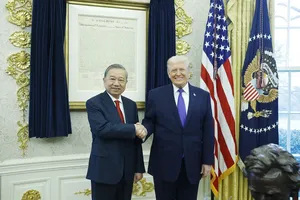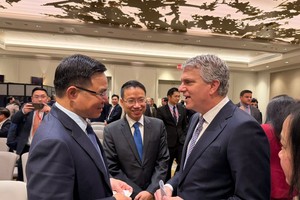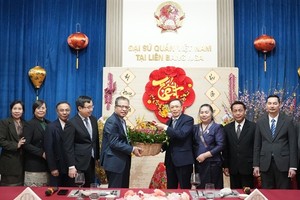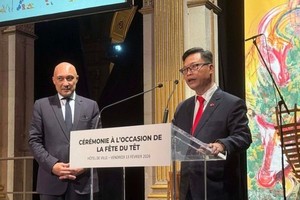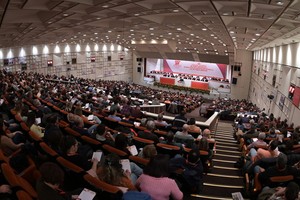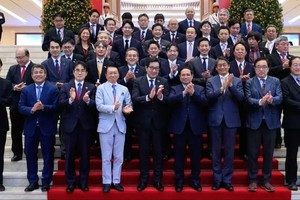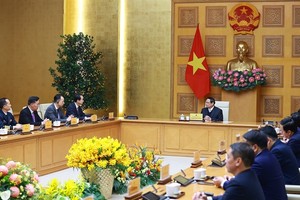 |
An electric truck is used to collect waste in Hue City. The United Nations Development Programme (UNDP) and the Embassy of Japan in Vietnam have handed over six electric trucks to Hue City for waste collection. (Photo courtesy of UNDP) |
These are the first electric trucks for garbage collection in Vietnam. Chairman of the People's Committee of Hue city Vo Le Nhat said the pilot replacement of some waste collection vehicles and garbage trucks by electric garbage trucks aligns with the goals and the desire of the city towards green public transport development and promotion of the waste classification at source programme in the city.
“The image of Hue city as the ‘ASEAN Environmentally Sustainable City', the ‘National Green City,’ is expected to be further advertised to international friends," Nhat said. "The living and working conditions of the people are expected to be improved. The socio-economic development is to be supported, contributing to implementing the UN's Sustainable Development Goals and other international commitments of Vietnam".
Vietnam has approved the Action Program on Green Transformation and Carbon and Methane Reduction of the Transport Sector.
The program aims to bolster energy efficiency and accelerate the adoption of electricity and green energy within the transport sector. By 2050, Vietnam envisions a complete transition to 100 percent electric road vehicles, a crucial step towards achieving net-zero greenhouse gas emissions from transportation.
Thua Hien-Hue province in central Vietnam will play a pivotal role in promoting these ambitious targets and driving the country's sustainable transportation agenda.
Shimonishi Kiyoshi, Deputy Consulate General of Japan in Da Nang, Vietnam said: "The Government of Japan will support Vietnam's efforts in energy transition, such as biomass power generation, hydroelectricity, ammonia, and carbon capture, utilisation and storage (CCUS), through the framework of the Zero Emission Asia-Pacific Partnership (AZEC),” he said. “We will collaborate with partner countries to assist Vietnam in reducing carbon emissions using renewable energy and other mechanisms under the Just Energy Transition Partnership (JETP).
This e-Mobility project contributes to building policies and support frameworks to promote the widespread reduction of carbon emissions in the transportation sector."
Patrick Haverman, UNDP Deputy Resident Representative in Vietnam, expressed his appreciation for the cooperation and leadership of the province in the green transport sector and the ‘great efforts to accelerate introducing six e-trucks for waste collection, providing concessional loans to encourage people to buy electric vehicles where 185 electric vehicles have been purchased in the first round of loan reimbursement, and develop modalities for bike/e-bike sharing in Hue."
"Promoting new and cleaner transport vehicles can bring sustainable benefits in many ways, and the pilot initiatives on solutions for e-mobility will be able to paint a clear picture of these benefits while also increasing social acceptance, defining existing barriers, and gathering lessons learned and evidence for policy formulation and wider replication," he added.
The UNDP-implemented project, ‘Catalysing a Sustainable Shift Towards E-Mobility in Vietnam,' supported by the Government of Japan, aims to reduce greenhouse gas emissions by enhancing the ecosystem for e-mobility and green transport at the national level. The activities in Hue City will serve as a model to showcase the feasibility and benefits of green transportation.
The project also supports the development of a national ecosystem for electric vehicles, including inputs to the national roadmap, policies, incentives, and charging infrastructure plans. The central province has been closely cooperating with international organisations and partners in boosting 'green' traffic by encouraging electric vehicles in the Master Plan 2021-2030 for submission to the Government for approval by the end of this year.
The development of electric vehicles towards green traffic development in Hue City has been seen as a positive solution in implementing the public transport project that the province and UNDP have been focusing on. It is also expected to improve physical and mental health and quality of life in Hue, a UNESCO-recognised world heritage site and tourist attraction.
Hue, in cooperation with the International Cooperation Agency of Germany (GIZ) and Vietsoftpro, has launched an innovative Public Bike-Sharing (PBS) scheme in developing a bicycle transportation plan for 2021-2026 that mobilises private investment for bike-sharing public services.
Hue, which has been an imperial capital in Vietnam for over 100 years, has been seen as a unique destination in central Vietnam with five UNESCO heritages: the ancient citadel relic complex, Hue royal court music, the Nguyen Dynasty’s wooden blocks, the Nguyen Dynasty’s royal administrative documents, and literature on Hue royal architecture.

